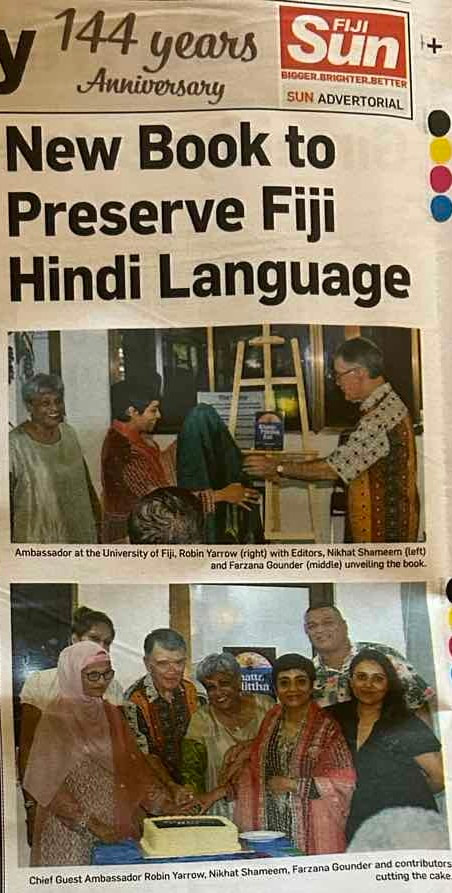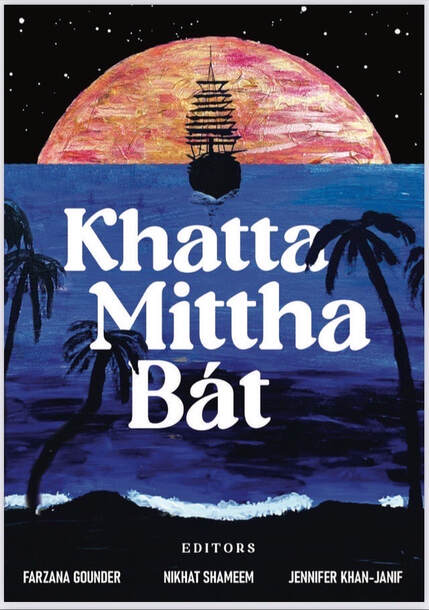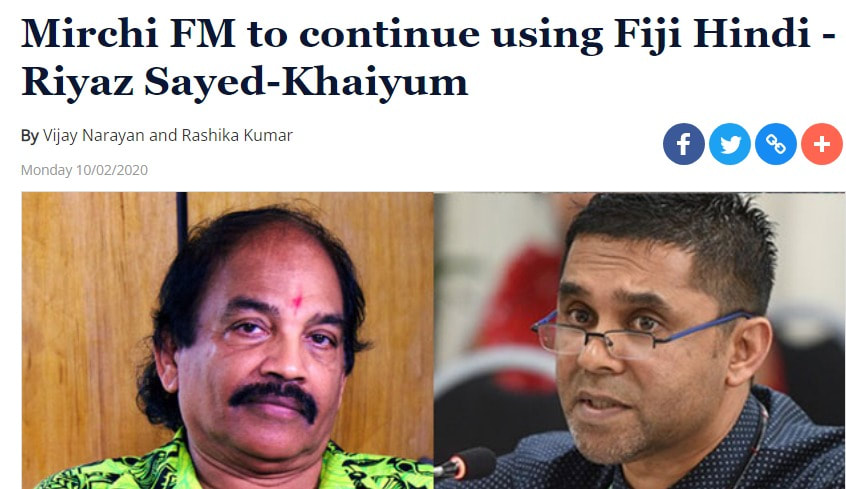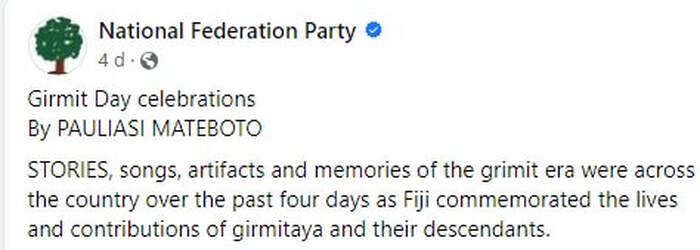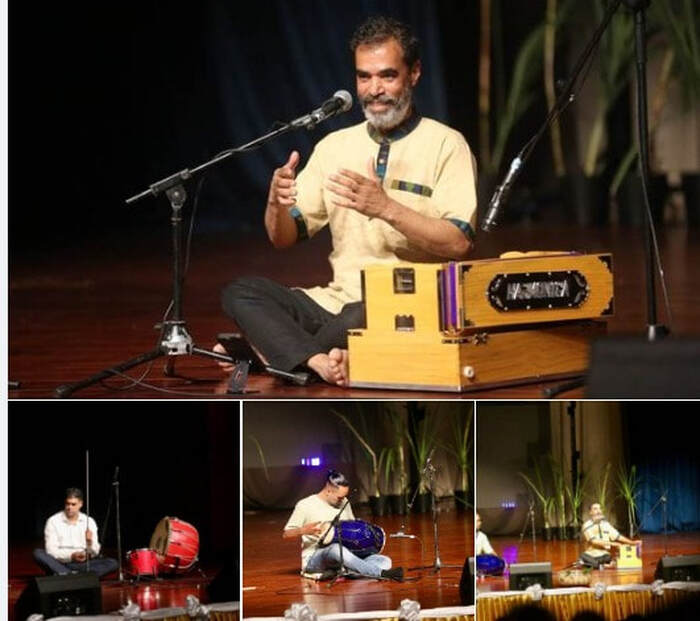"The day Indo-Fijian politicians kill Fiji Hindi, they will be killing a part of their history and heritage in Fiji. For no matter where one goes in the world, the moment one hears an Indo-Fijian open his mouth, one immediately asks him: ‘What part of Fiji are you from?’ In a similar vein, India Indians are able to separate us from them solely on the basis of our Fiji Hindi. If the Indo-Fijian politicians and aspiring candidates are too ashamed to speak to us in the language of our coolie forefathers, they should pack their bags and their manifestoes and take the next Air India flight to India, and wait there for the next general election in that country to practice their Shudh Hindi. We don’t need Indian political impostors in Fiji. Such candidates and Indo-Fijian leaders do not deserve our sympathy or votes.
Long live FIJI HINDI."
Victor Lal, Fiji Sun Opinion Column, 2006
*The historical re-enactment of our past history, songs, suffering and tragedy in the language of our coolie ancestors - Fiji Hindi - during the Girmit celebrations is compelling proof why it must be our primary language in schools and in the day-to-day lives of the Indo-Fijians (and other races) who understand Fiji Hindi.
*After all, Biman Prasad's wife Rajni and Ganesh Chand were given thousands of dollars to fly in Bhojpuri singers from Surinam, who we could relate to and understand, unlike the pseudo pompous BJP Hindi of BIMAN PRASAD, MAHENDRA CHAUDHRY and other Hindi speakers.
*We also welcome KHATTA MITTHA BAT, a new book that was released on 11 May, that captures and promotes Fiji Hindi Sayings and Advice.
"Fiji Hindi is a language that arose from Indian indenture and is a source of knowledge and culture for the Indo-Fijian community. The language has a unique mix of Hindi, Urdu, Bhojpuri, English and Fijian vocabulary. As such, documenting it is now critical for language revitalisation efforts, and for supporting its use in communication and education within the Indo-Fijian community in Fiji and abroad." Editors, Khatta Mittha Bat
Khatta Mittha Bàt: A New Book Preserving Fiji Hindi Sayings and Advice
Khatta Mittha Bàt has been produced by Farzana Gounder, Nikhat Shameem, and Jennifer Khan-Janif to help preserve and promote the Fiji Hindi language.
The book contains a collection of Fiji Hindi kahawat and advice, most linked with the evolution of Indo-Fijians as Girmit descendants and inheritors of a Girmit Hindustani identity and culture.
Fiji Hindi is a language that arose from Indian indenture and is a source of knowledge and culture for the Indo-Fijian community. The language has a unique mix of Hindi, Urdu, Bhojpuri, English and Fijian vocabulary. As such, documenting it is now critical for language revitalisation efforts, and for supporting its use in communication and education within the Indo-Fijian community in Fiji and abroad.
The book launch event was held at the University of Fiji, Samabula Campus on May 11, 2023. The book was launched by the chief guest Ambassador Robin Yarrow.
The book, which is published by the University of Fiji together with the Greenhouse Studio, is now available for purchase.
The book's editors acknowledge the contributors, including photographers, writers, artists, friends, family, muses, community members and participants of their orthography workshop in Auckland, Aotearoa New Zealand in May 2020. They are also grateful to UNESCO New Zealand for providing financial support for the workshop, which allowed them to trial and further standardise the Fiji Hindi orthography that was then used in the book.
The book's sayings cover core areas of wisdom, perseverance, identity, hope, respect, and resilience, and weave their way through the language's unique humour and irony along with the community’s history. The book includes the equivalent English meaning for each kahawat to provide greater understanding of context and flavour and for the enjoyment of a wider audience.
Khatta Mittha Bàt is an important step in documenting and promoting Fiji Hindi. The book's editors hope that the script used in this book will become widely adopted in the Indo-Fijian community and serve as an additional means of communication. Documenting Fiji Hindi allows linguists to study its unique features, grammar, and vocabulary, providing insights into the nature of language and how it evolves over time. It is a source of knowledge and culture for the Indo-Fijian community, containing unique information about their history, customs, and traditions.
"We are incredibly excited to share this book with you and hope that you will join us in celebrating the rich culture and history of Fiji Hindi. Khatta Mittha Bàt is a must-read for anyone interested in learning more about our language, remembering those who coined these sayings and honouring our community that speaks it," said the editors.
To get a copy of Khatta Mittha Bàt, please visit the University of Fiji Bookshop, Saweni or the University of Fiji online store. It is also available in Kindle version.
Khatta Mittha Bàt has been produced by Farzana Gounder, Nikhat Shameem, and Jennifer Khan-Janif to help preserve and promote the Fiji Hindi language.
The book contains a collection of Fiji Hindi kahawat and advice, most linked with the evolution of Indo-Fijians as Girmit descendants and inheritors of a Girmit Hindustani identity and culture.
Fiji Hindi is a language that arose from Indian indenture and is a source of knowledge and culture for the Indo-Fijian community. The language has a unique mix of Hindi, Urdu, Bhojpuri, English and Fijian vocabulary. As such, documenting it is now critical for language revitalisation efforts, and for supporting its use in communication and education within the Indo-Fijian community in Fiji and abroad.
The book launch event was held at the University of Fiji, Samabula Campus on May 11, 2023. The book was launched by the chief guest Ambassador Robin Yarrow.
The book, which is published by the University of Fiji together with the Greenhouse Studio, is now available for purchase.
The book's editors acknowledge the contributors, including photographers, writers, artists, friends, family, muses, community members and participants of their orthography workshop in Auckland, Aotearoa New Zealand in May 2020. They are also grateful to UNESCO New Zealand for providing financial support for the workshop, which allowed them to trial and further standardise the Fiji Hindi orthography that was then used in the book.
The book's sayings cover core areas of wisdom, perseverance, identity, hope, respect, and resilience, and weave their way through the language's unique humour and irony along with the community’s history. The book includes the equivalent English meaning for each kahawat to provide greater understanding of context and flavour and for the enjoyment of a wider audience.
Khatta Mittha Bàt is an important step in documenting and promoting Fiji Hindi. The book's editors hope that the script used in this book will become widely adopted in the Indo-Fijian community and serve as an additional means of communication. Documenting Fiji Hindi allows linguists to study its unique features, grammar, and vocabulary, providing insights into the nature of language and how it evolves over time. It is a source of knowledge and culture for the Indo-Fijian community, containing unique information about their history, customs, and traditions.
"We are incredibly excited to share this book with you and hope that you will join us in celebrating the rich culture and history of Fiji Hindi. Khatta Mittha Bàt is a must-read for anyone interested in learning more about our language, remembering those who coined these sayings and honouring our community that speaks it," said the editors.
To get a copy of Khatta Mittha Bàt, please visit the University of Fiji Bookshop, Saweni or the University of Fiji online store. It is also available in Kindle version.
Fijileaks: We have fought against the imposition of HINDI over Fiji Hindi, a plantation Hindi that attests to our girmit history in Fiji, starting in 1879
Several potential voters wrote to me complaining that instead of speaking in the everyday Fiji Hindi to them, the candidates have been making speeches in Shudh (Standard/Correct) Hindi, a language a vast majority of the Indo-Fijian voters hardly understand.
A similar spectacle has been displayed during Question Time and Talk Back programmes on Fiji TV. I decided to watch the appearance of Lekh Ram Vayeshnoi of the Fiji Labour Party, Bimal Prasad of the National Federation Party, Shiu Ram of COIN Party and Dildar Shah of the National Alliance Party on these two programmes.
Again, a pathetic reoccurring pattern, as if Vayeshnoi, who is contesting the Nadroga Indian Communal seat, was reading a script out of the Hindu holy book, the Bhagavad Gita. When, all he was trying to do, was to explain his party’s manifesto (for which there is no Fiji Hindi word).
The other three were equally guilty, and at times I felt sorry for Shiu Ram, who even resorted to English to make his point, instead of opting to speak the language of the Indo-Fijian masses, and over 30 per cent of taukei Fijians – Fiji Hindi.
What is wrong with speaking Fiji Hindi? Are they ashamed of the language of their coolie forefathers? Why are these Indo-Fijian candidates contesting the Indian communal seats when they are by commission or omission, speaking to the voters in the language of ‘Mother India’.
For God’s sake, even Indian candidates, despite belonging to different political parties, speak in the 700 different dialects and languages to their prospective voters in India. A regional aspiring candidate in Madras will be speaking in Madrassi, and even the Communist candidate in Bengal will be pouting his Maoist and Stalinist propaganda in Bengali. The Italian-born Mrs Sonia Gandhi, the leader of the Congress Party, also speaks in a Hindi language which is understood by the vast majority of the voters.
More importantly, the candidates in Bihar would be speaking in Bhojpuri or Awadhi, from which the corrupt version of Fiji Hindi has originated in our country. So why can not our own aspiring Indo-Fijian politicians speak the language of their people?.
As Nemani Bainivalu, a University of the South Pacific Hindi graduate, and later a cultural assistant with the National Reconciliation Unit, had once pointed out, only 20 percent of Indo-Fijians can read and write their formal language.
Many Indo-Fijians cannot even read their holy books written in the Khadee Bolee dialect, and pass on religious teachings by word. I am not suggesting that Sudh Hindi be replaced in our education system, or that everyone should be writing novels like Dauka Puran by Professor Subramani of the Department of Literature and Language at the USP.
What I am protesting against is the gibberish Shudh Hindi that is being shoved down the throats of Indo-Fijian voters who are struggling to ‘swallow’ the words. The election message and manifestoes of the political parties would be better understood if the Indo-Fijian candidates resorted to the conversational Fiji Hindi at the hustings. It will also help bring the taukei Fijians into the campaign, especially the 30 per cent who speak the language, and many others who have a smattering command of it.
It must be made very clear to Indo-Fijian candidates that despite the teaching of Shudh Hindi and Urdu in schools, Fiji Hindi is an integral part of the identity and culture of the Indo-Fijian population. It is unique to Indo-Fijians in the world. The day Indo-Fijian politicians kill Fiji Hindi, they will be killing a part of their history and heritage in Fiji.
For no matter where one goes in the world, the moment one hears an Indo-Fijian open his mouth, one immediately asks him: ‘What part of Fiji are you from?’ In a similar vein, India Indians are able to separate us from them solely on the basis of our Fiji Hindi.
If the Indo-Fijian politicians and aspiring candidates are too ashamed to speak to us in the language of our coolie forefathers, they should pack their bags and their manifestoes and take the next Air India flight to India, and wait there for the next general election in that country to practice their Shudh Hindi. We don’t need Indian political impostors in Fiji.
Such candidates and Indo-Fijian leaders do not deserve our sympathy or votes.
Long live FIJI HINDI.
A similar spectacle has been displayed during Question Time and Talk Back programmes on Fiji TV. I decided to watch the appearance of Lekh Ram Vayeshnoi of the Fiji Labour Party, Bimal Prasad of the National Federation Party, Shiu Ram of COIN Party and Dildar Shah of the National Alliance Party on these two programmes.
Again, a pathetic reoccurring pattern, as if Vayeshnoi, who is contesting the Nadroga Indian Communal seat, was reading a script out of the Hindu holy book, the Bhagavad Gita. When, all he was trying to do, was to explain his party’s manifesto (for which there is no Fiji Hindi word).
The other three were equally guilty, and at times I felt sorry for Shiu Ram, who even resorted to English to make his point, instead of opting to speak the language of the Indo-Fijian masses, and over 30 per cent of taukei Fijians – Fiji Hindi.
What is wrong with speaking Fiji Hindi? Are they ashamed of the language of their coolie forefathers? Why are these Indo-Fijian candidates contesting the Indian communal seats when they are by commission or omission, speaking to the voters in the language of ‘Mother India’.
For God’s sake, even Indian candidates, despite belonging to different political parties, speak in the 700 different dialects and languages to their prospective voters in India. A regional aspiring candidate in Madras will be speaking in Madrassi, and even the Communist candidate in Bengal will be pouting his Maoist and Stalinist propaganda in Bengali. The Italian-born Mrs Sonia Gandhi, the leader of the Congress Party, also speaks in a Hindi language which is understood by the vast majority of the voters.
More importantly, the candidates in Bihar would be speaking in Bhojpuri or Awadhi, from which the corrupt version of Fiji Hindi has originated in our country. So why can not our own aspiring Indo-Fijian politicians speak the language of their people?.
As Nemani Bainivalu, a University of the South Pacific Hindi graduate, and later a cultural assistant with the National Reconciliation Unit, had once pointed out, only 20 percent of Indo-Fijians can read and write their formal language.
Many Indo-Fijians cannot even read their holy books written in the Khadee Bolee dialect, and pass on religious teachings by word. I am not suggesting that Sudh Hindi be replaced in our education system, or that everyone should be writing novels like Dauka Puran by Professor Subramani of the Department of Literature and Language at the USP.
What I am protesting against is the gibberish Shudh Hindi that is being shoved down the throats of Indo-Fijian voters who are struggling to ‘swallow’ the words. The election message and manifestoes of the political parties would be better understood if the Indo-Fijian candidates resorted to the conversational Fiji Hindi at the hustings. It will also help bring the taukei Fijians into the campaign, especially the 30 per cent who speak the language, and many others who have a smattering command of it.
It must be made very clear to Indo-Fijian candidates that despite the teaching of Shudh Hindi and Urdu in schools, Fiji Hindi is an integral part of the identity and culture of the Indo-Fijian population. It is unique to Indo-Fijians in the world. The day Indo-Fijian politicians kill Fiji Hindi, they will be killing a part of their history and heritage in Fiji.
For no matter where one goes in the world, the moment one hears an Indo-Fijian open his mouth, one immediately asks him: ‘What part of Fiji are you from?’ In a similar vein, India Indians are able to separate us from them solely on the basis of our Fiji Hindi.
If the Indo-Fijian politicians and aspiring candidates are too ashamed to speak to us in the language of our coolie forefathers, they should pack their bags and their manifestoes and take the next Air India flight to India, and wait there for the next general election in that country to practice their Shudh Hindi. We don’t need Indian political impostors in Fiji.
Such candidates and Indo-Fijian leaders do not deserve our sympathy or votes.
Long live FIJI HINDI.
The Hindi Parishad Fiji is calling on Fijian Broadcasting Corporation for one of their radio stations, Mirchi FM to discontinue broadcasting in Fiji Hindi while FBC CEO, Riyaz Sayed-Khaiyum says that as a commercial radio station, they have made a commitment to try to connect to as many people as possible because all Indo-Fijians in Fiji speak Fiji Hindi.
The Hindi Parishad Fiji Assistant Secretary, Vigyan Sharma says they are extremely dissatisfied on the use of Fiji Hindi on Mirchi FM and is concerned with the levels of public outcry.
Hindi Parishad Fiji is made up of various faith based Hindi speaking organisations. These include Arya Pratinidhi Sabha of Fiji, Shree Sanatan Dharm Pratinidhi Sabha of Fiji, TISI Sangam, Gujarat Society, Hanuman Chalisa Pariwar, Hindi Writers Forum, Hare Krishna Movement, Sai Sanstha, Fiji Sevashram Sangha, Global Organisation of People of Indian Origin, The Sikh Gurdwara Prabandhak Committee Fiji, Shree Sanatan Dharam Brahman Purohit Sabha of Fiji , Ramcharitmanas Fiji , Fiji Hindu Society, and Hindi Teachers Association.
They believe that Fiji Hindi is a spoken dialect which is spoken informally in social settings and at home and on any formal platform, individuals are prompted to speak in a standard language.
They say that Mirchi FM did not consult any Hindi language stakeholders nor any public consultations were held.
They also say that it was very disappointing to note that FBC’s talk back show, Aaina on the 21st of last month only featured a panel who were in support of Fiji Hindi and callers were deliberately cut short or interrupted.
The Parishad also say that they are very concerned about the growing tensions on social media and are distancing themselves from any form of racial, political or hare statements made by any individuals.
Vigyan Sharma also says the roots of the diverse set of religious beliefs, traditions and philosophy of Hindus were laid during the Vedic age, and most of the religious scriptures are written in standard Hindi. Sharma says the general feeling of the followers of Hinduism is that Hindi is associated to religion and form an integral element of their identity as it directly connects them to their roots, and therefore must be protected and promoted.
FBC CEO, Riyaz Sayed-Khaiyum says the decision to switch to Fiji Hindi on one of their radio stations has been done at the behest of their listeners.
He says the station started to experiment Fiji Hindi more than a year ago and during that year, they did not receive a single complaint in regards to this.
Sayed-Khaiyum says that social media is not the correct indicator of acceptance and there are many factors to consider such as fake profiles and political and group agendas.
He says that at the Regional Hindi Conference, Fiji Hindi was accepted by eminent authorities in linguistics as a bonafide language.
Riyaz Sayed-Khaiyum says it is nonsensical to associate language and religion.
The Hindi Parishad Fiji Assistant Secretary, Vigyan Sharma says they are extremely dissatisfied on the use of Fiji Hindi on Mirchi FM and is concerned with the levels of public outcry.
Hindi Parishad Fiji is made up of various faith based Hindi speaking organisations. These include Arya Pratinidhi Sabha of Fiji, Shree Sanatan Dharm Pratinidhi Sabha of Fiji, TISI Sangam, Gujarat Society, Hanuman Chalisa Pariwar, Hindi Writers Forum, Hare Krishna Movement, Sai Sanstha, Fiji Sevashram Sangha, Global Organisation of People of Indian Origin, The Sikh Gurdwara Prabandhak Committee Fiji, Shree Sanatan Dharam Brahman Purohit Sabha of Fiji , Ramcharitmanas Fiji , Fiji Hindu Society, and Hindi Teachers Association.
They believe that Fiji Hindi is a spoken dialect which is spoken informally in social settings and at home and on any formal platform, individuals are prompted to speak in a standard language.
They say that Mirchi FM did not consult any Hindi language stakeholders nor any public consultations were held.
They also say that it was very disappointing to note that FBC’s talk back show, Aaina on the 21st of last month only featured a panel who were in support of Fiji Hindi and callers were deliberately cut short or interrupted.
The Parishad also say that they are very concerned about the growing tensions on social media and are distancing themselves from any form of racial, political or hare statements made by any individuals.
Vigyan Sharma also says the roots of the diverse set of religious beliefs, traditions and philosophy of Hindus were laid during the Vedic age, and most of the religious scriptures are written in standard Hindi. Sharma says the general feeling of the followers of Hinduism is that Hindi is associated to religion and form an integral element of their identity as it directly connects them to their roots, and therefore must be protected and promoted.
FBC CEO, Riyaz Sayed-Khaiyum says the decision to switch to Fiji Hindi on one of their radio stations has been done at the behest of their listeners.
He says the station started to experiment Fiji Hindi more than a year ago and during that year, they did not receive a single complaint in regards to this.
Sayed-Khaiyum says that social media is not the correct indicator of acceptance and there are many factors to consider such as fake profiles and political and group agendas.
He says that at the Regional Hindi Conference, Fiji Hindi was accepted by eminent authorities in linguistics as a bonafide language.
Riyaz Sayed-Khaiyum says it is nonsensical to associate language and religion.
